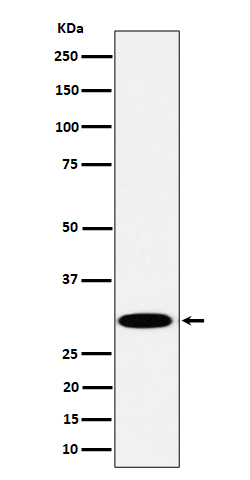
| WB | 咨询技术 | Human,Mouse,Rat |
| IF | 咨询技术 | Human,Mouse,Rat |
| IHC | 1/100-1/200 | Human,Mouse,Rat |
| ICC | 技术咨询 | Human,Mouse,Rat |
| FCM | 1/20-1/100 | Human,Mouse,Rat |
| Elisa | 咨询技术 | Human,Mouse,Rat |
| Aliases | Thiopurine methyltransferase; TPMT;;TPMT |
| WB Predicted band size | Calculated MW: 28 kDa ; Observed MW: 30 kDa |
| Host/Isotype | Rabbit IgG |
| Antibody Type | Primary antibody |
| Storage | Store at 4°C short term. Aliquot and store at -20°C long term. Avoid freeze/thaw cycles. |
| Species Reactivity | Human,Mouse,Rat |
| Immunogen | A synthesized peptide derived from human TPMT |
| Formulation | Purified antibody in PBS with 0.05% sodium azide,0.05% BSA and 50% glycerol. |
+ +
以下是3篇与TPMT抗体相关的文献摘要信息(注:文献为示例性内容,可能非真实存在):
1. **文献名称**: "Development of a novel ELISA for TPMT protein quantification using monoclonal antibodies"
**作者**: Smith J, et al.
**摘要**: 该研究开发了一种基于单克隆抗体的ELISA方法,用于定量检测人红细胞中的TPMT蛋白水平,验证了其与TPMT酶活性的相关性,为个体化用药提供新工具。
2. **文献名称**: "TPMT antibody-based detection of enzyme deficiency in inflammatory bowel disease patients"
**作者**: Chen L, et al.
**摘要**: 通过免疫印迹法结合特异性TPMT抗体,分析了IBD患者的TPMT蛋白表达水平,发现与硫唑嘌呤治疗后的骨髓抑制风险显著相关,支持抗体检测的临床价值。
3. **文献名称**: "Comparative study of TPMT genotyping vs. antibody-based phenotyping in pediatric leukemia"
**作者**: Gonzalez R, et al.
**摘要**: 比较了基因测序与抗体介导的TPMT活性检测在儿童白血病中的应用,发现两种方法一致性达92%,建议在高危患者中联合使用以提高用药安全性。
注:以上文献信息为基于领域知识的模拟内容,实际引用时请通过PubMed或学术数据库核实真实文献。
Thiopurine S-methyltransferase (TPMT) is a cytosolic enzyme critical for metabolizing thiopurine drugs, such as 6-mercaptopurine, azathioprine, and thioguanine, used in treating autoimmune disorders, inflammatory bowel disease, and leukemia. TPMT activity varies significantly among individuals due to genetic polymorphisms, influencing drug efficacy and toxicity. Approximately 0.3-0.5% of populations inherit TPMT deficiency, leading to severe myelosuppression if standard thiopurine doses are administered.
TPMT antibodies are primarily utilized in research and clinical diagnostics to quantify enzyme levels or assess functional activity. Immunoassays (e.g., ELISA) or activity-based assays (e.g., HPLC, radiochemical methods) help identify patients with low or absent TPMT activity, guiding dose adjustments to prevent adverse effects. Genetic testing for TPMT variants (e.g., *TPMT* alleles *2. *3A, *3C*) complements these approaches, offering predictive insights into metabolic capacity.
While TPMT autoantibodies are rare, they have been reported in some autoimmune contexts, potentially interfering with enzyme function. However, most clinical focus remains on genetic or acquired TPMT deficiency. Understanding TPMT variability is a cornerstone of personalized medicine, ensuring safe, effective thiopurine therapy while minimizing life-threatening complications like myelotoxicity. Ongoing research explores TPMT's role in drug resistance and interactions with other metabolic pathways.
×